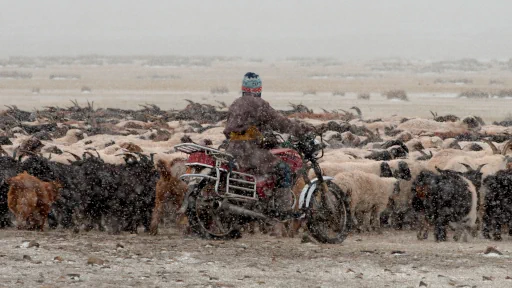Opinion Editorial Archive October, 2022: Winter of Discontent

Given the circumstances leading to her predecessor's downfall, I would have thought it paramount that new British Prime Minister Liz Truss spell out in her first speech last month exactly what her country faces — a winter of discontent. Instead, she appeared to view the world through rose-colored glasses. That won't last long and nor might she.
Like the Mongolian herder in this month's photo, the people in her country face a severe winter. Not because of climate change (although that could make things worse), but because of the looming energy crisis.
Generally speaking, the further north you live the greater that energy crisis will impact you this winter. The notable exceptions are Arctic indigenous peoples such as the Inuit, Saami and Nenets. They have survived without natural gas heating for thousands of years in the harshest of winter climates. Ironically, the regions in which they live are now warming at about twice the global average rate and that poses a much greater threat to them.
Past treatment of some Arctic indigenous peoples certainly amounts to crimes against humanity. While the Uighur are not an Arctic people, a United Nations report last month suggested that China might also be guilty of crimes against humanity in its recent treatment of them.
Under Augusto Pinochet, Chile certainly mistreated its indigenous population. Last month Chileans had the opportunity to vote for a proposed new constitution — arguably the most progressive constitution in modern history — that would (among many other things) have enshrined the rights of its indigenous people. They voted against it. In an article for The Guardian, writer Ariel Dorfman speculated that this inclusion of indigenous rights might have been one reason for the dissenting vote.
Understanding the world is getting harder. While Kenya's Supreme Court upheld William Ruto's presidential victory last month, the more significant victor was democracy itself. That may not be the case in Brazil tomorrow. While the outcome of its presidential election is hard to predict, claims of fraud are very likely to follow. Even a military coup is possible and that might be a better outcome for its indigenous people than four more years of Bolsonaro.
Another UN report last month revealed that ninety percent of the world saw a reversal on the Human Development Index last year (a measure that has been tracked for only thirty years). That's a far cry from what we were achieving in the Fertile Crescent thousands of years ago. Yet a report by the Cyprus Institute last month suggests that the region could be devastated by the end of this century. Perhaps we are about to face many winters of discontent.
If you enjoyed reading this month's opinion editorial, please consider supporting independent, advertising-free journalism by buying us a coffee to help us cover the cost of hosting our web site. Please click on the link or scan the QR code. Thanks!

